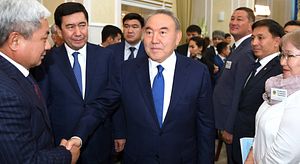On February 21, Kazakh President Nursultan Nazarbayev criticized this government in a sweeping statement that cited failures to raise incomes or improve living standards. Nazarbayev said the government should resign and shortly thereafter the presidential office announced the appointment of an active prime minister.
“Under these conditions, as president and guarantor of the constitution, I am taking into account the interests of our people and making the following decision. I believe that the government should resign,” he said in a statement published on the presidential website and reportedly broadcast on television.
In the statement, Nazarbayev lamented that despite new laws and government efforts, positive results had not been achieved in several areas. Crediting growth to “raw materials,” Nazarbayev said that the government and National Bank failed to create sufficient incentives to promote high-quality growth. Nazarbayev’s statement places blame squarely on the government, stressing that he issued instructions to improve incomes and quality of life but that members of the government, ministers and regional governors were inadequate in their efforts to listen to people’s problems and work with them to carry out the president’s policies.
Nazarbayev, 78, has been president of Kazakhstan since before its independence from the collapsing Soviet Union in 1991. His party, Nur Otan, holds 84 of 98 seats in the lower house of the country’s parliament. Kazakhstan has never held an election judge free and fair by legitimate international observers.
In his statement, the president said that at the next Nur Otan congress he would propose measures to strengthen social support systems and improve the quality of life for Kazakhs.
Many reports (such as those in RFE/RL and Eurasianet) regarding Nazarbayev’s decision point squarely to recent protests as a triggering factor. The protests, comprised largely of hundreds of angry mothers, were sparked by a fire in early February that claimed the lives of five children in a single family. The five girls, aged 3 months to 13 years, were killed in a blaze in Astana while their parents were both away working overnight shifts.
As Paul Stronski, of the Carnegie Endowment for International Peace, wrote in a commentary published by Eurasianet, the fire “epitomize[d] many of the country’s social problems, as well as the widening gap between the government and the governed.”
Kazakhs “want a government that lives up to its pledges, but it is unclear whether anyone is listening,” Stronski wrote.
A week later, women crowded into a concert hall in Astana to demand city authorities take action to provide proper housing, public kindergartens and increased social allowances for families. The women, who demanded to see Astana Mayor Bakhyt Sultanov, reportedly shouted down his deputy when he tried to speak in Russian rather than Kazakh.
Shuffling government officials in response to perceived (or actual) failures is not uncommon in Central Asia. Last fall, Nazarbayev promoted the mayor of Astana into the presidential office as his new chief of staff. While Nazarbayev hailed Aset Isekeshev for his efforts to organize and execute EXPO 2017, analysts noted the mayor’s mishandling of flash flooding in the capital. Nevertheless, firing the entire government is a dramatic move.
Prime Minister Bakytzhan Sagintayev has been in office since September 2016 when he replaced longtime Prime Minister Karim Massimov (who was put in charge of the National Security Committee). Nazarbayev appointed Deputy Prime Minister Askar Mamin as active prime minister until a new government is formed.
Whether a new government will placate Kazakh citizens remains to be seen; it will, after all, be drawn from the same deck Nazarbayev has played from for more than two decades. Chances are that the new government will have many of the same faces in it — so where change will come from is anyone’s guess.

































